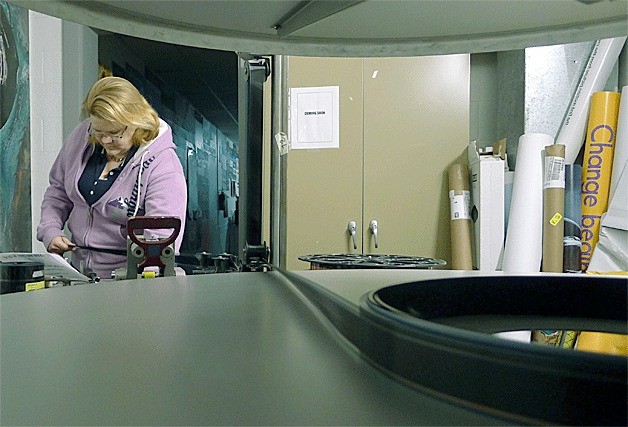2012 won’t be the end of the world, but it is the end of film at Whidbey movie theaters.
Whidbey movie theater operators are spending tens of thousands of dollars to replace their venerable film projectors with digital equipment in order to meet requirements set by the industry.
Theater operators are scrambling to make the upgrades because distributors will soon stop dispersing traditional 35 mm film. Instead of movie theater staff threading projectors, they will have to access a hard drive on a computer to start a movie.
Oak Harbor Cinemas appears to be the last theater on Whidbey Island to thread a projector before a showing. The Blue Fox Drive-In north of Coupeville purchased its digital equipment and will have it installed before it re-opens in early January, and The Clyde Theatre in Langley purchased and installed its new projector last year.
The Oak Harbor Cinema, which has three movie theaters at its Barlow Street location, is scheduled to make the transition sometime in January, and staff are concerned as film will become tougher to find.
“It will be really difficult to get film,” said Sherry Sloyke, manager at Oak Harbor Cinemas. “We are trying our best to get them.”
The small movie house is owned by a chain that operates theaters in Bremerton, Bainbridge Island and Ocean Shores. Sloyke said the company was upgrading its theaters one at a time.
The Blue Fox Drive-In has been holding a fundraiser for months to try and raise the approximately $80,000 cost for the new projector.
Darrell Bratt, owner of the Blue Fox Drive-In, said the community has been very supportive and the fundraiser contributed around 80 percent of the cost.
He took out a loan to pay the remainder.
He is still raising money through T-shirt and sweatshirt sales.
The Blue Fox Drive-In is closed for several weeks through December.
He said the projector will be installed Jan. 8 in time for the re-opening scheduled for Jan. 11.
The Clyde Theatre, which operates in Langley, switched to a digital system one year ago.
Owner Blake Willeford said he wanted to get the conversion out of the way early so he wouldn’t have problems finding equipment or electricians to install it.
He said the digital technology has made his duties as a projectionist easier and he can spend more time serving customers.
The customers seem to be enjoying the quality of the showings too.
“There’s no such thing as scratched film anymore,” Willeford said.
He noted that he hoped he would eventually save money on shipping costs because the hard drive is lighter than the film canisters; however, the distributor has been over-nighting digital films that has proven more costly.
With the transition to digital, the movie theaters are left with old projectors that have been operating reliably for decades but have become obsolete.
Bratt said he isn’t sure what he is going to do with his old equipment yet.



